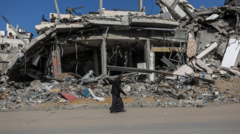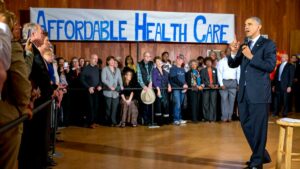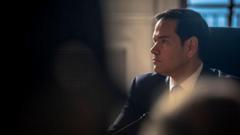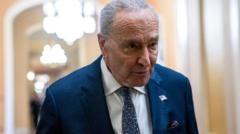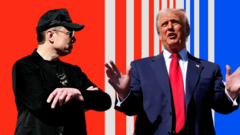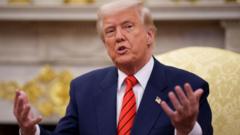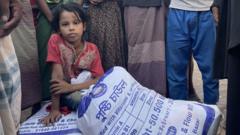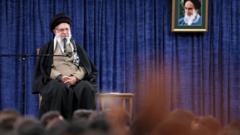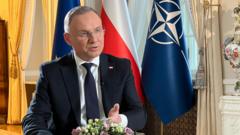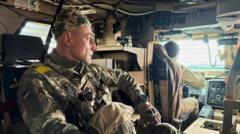The US Office of Management and Budget sent a questionnaire with 36 questions to UN aid organizations, raising alarm that this may signal a withdrawal from humanitarian commitments and a challenge to the principles of neutrality in aid work.
**US Questions UN Aid Groups' Political Affiliations Amid Funding Cuts**
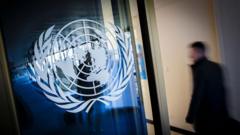
**US Questions UN Aid Groups' Political Affiliations Amid Funding Cuts**
US aid agencies are asking humanitarian organizations if they have ties to communism and anti-American ideologies, stirring concerns about future humanitarian support.
The US government's Office of Management and Budget (OMB) has initiated a controversial inquiry, sending questionnaires to major United Nations (UN) aid agencies regarding perceived affiliations with ideologies that oppose American values, including communism and socialism. This move has sparked fears among organizations such as the UN Refugee Agency and the International Committee of the Red Cross that the United States may be preparing to significantly decrease or completely withdraw its humanitarian support.
Amidst a broader cost-cutting campaign led by the Trump administration, which has been increasingly skeptical of foreign aid, these questionnaires pose pointed questions. Among the 36 inquiries, one directly asks these agencies to confirm they have no connections to any political entities that may advocate anti-American sentiments.
With the US's existing role as a leader in global humanitarian funding—providing roughly 40% of such resources despite allocating a smaller GDP percentage compared to European nations—this shift has the potential to reshape the landscape of international aid. The questionnaires have raised alarms given the recent US withdrawal from vital humanitarian partnerships, including its exit from the World Health Organization.
Political analysts and humanitarian experts, like Professor Karl Blanchet, suggest this could lead to a pivotal change in multilateral relations, indicating a clear preference for an "America First" approach. The request for clarification on whether organizations engage in projects linked to diversity, equity, and climate resilience reflects the administration's ongoing internal and external pressures. This has led to notable unease among aid workers, who see the inquiries as not only an intrusion into their operational integrity but also as an implicit threat to their survival.
The implications are significant; some humanitarian efforts, particularly those addressing complex crises, may find it increasingly difficult to navigate this political landscape. The UN Human Rights office has already opted to sidestep the questionnaire, indicating a reluctance to engage with questions perceived as undermining their impartial, humanitarian mission.
As debates around aid, political affiliations, and international cooperation continue, the responses from humanitarian organizations and their capacity to operate under these new scrutiny will likely be closely watched by the global community. The outcome of this inquiry could redefine US engagement in global humanitarian efforts moving forward.
Amidst a broader cost-cutting campaign led by the Trump administration, which has been increasingly skeptical of foreign aid, these questionnaires pose pointed questions. Among the 36 inquiries, one directly asks these agencies to confirm they have no connections to any political entities that may advocate anti-American sentiments.
With the US's existing role as a leader in global humanitarian funding—providing roughly 40% of such resources despite allocating a smaller GDP percentage compared to European nations—this shift has the potential to reshape the landscape of international aid. The questionnaires have raised alarms given the recent US withdrawal from vital humanitarian partnerships, including its exit from the World Health Organization.
Political analysts and humanitarian experts, like Professor Karl Blanchet, suggest this could lead to a pivotal change in multilateral relations, indicating a clear preference for an "America First" approach. The request for clarification on whether organizations engage in projects linked to diversity, equity, and climate resilience reflects the administration's ongoing internal and external pressures. This has led to notable unease among aid workers, who see the inquiries as not only an intrusion into their operational integrity but also as an implicit threat to their survival.
The implications are significant; some humanitarian efforts, particularly those addressing complex crises, may find it increasingly difficult to navigate this political landscape. The UN Human Rights office has already opted to sidestep the questionnaire, indicating a reluctance to engage with questions perceived as undermining their impartial, humanitarian mission.
As debates around aid, political affiliations, and international cooperation continue, the responses from humanitarian organizations and their capacity to operate under these new scrutiny will likely be closely watched by the global community. The outcome of this inquiry could redefine US engagement in global humanitarian efforts moving forward.



